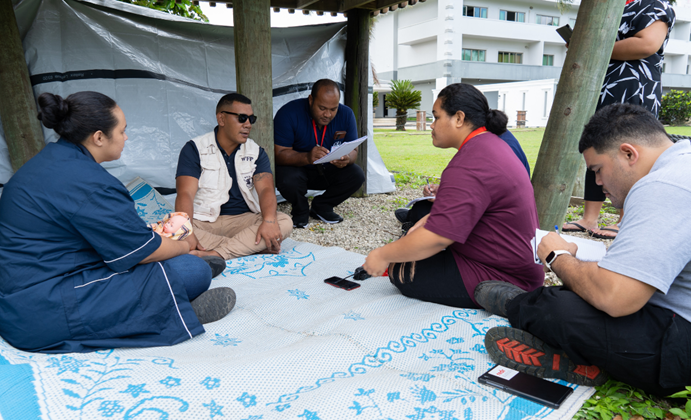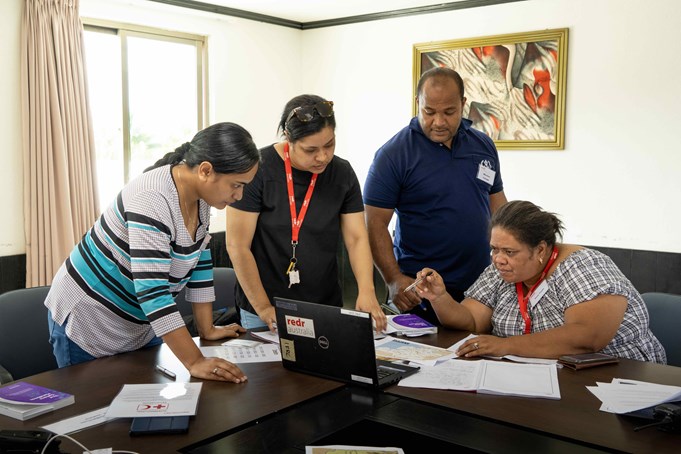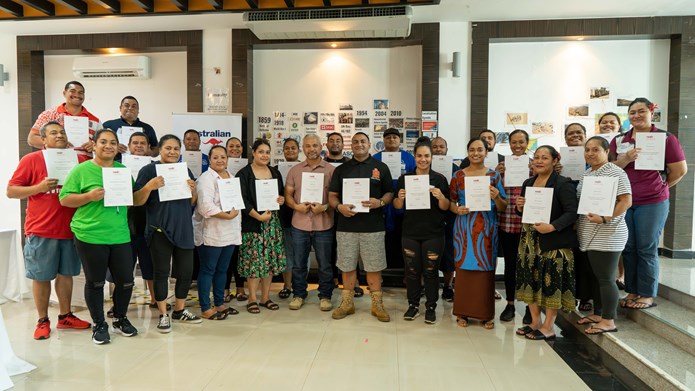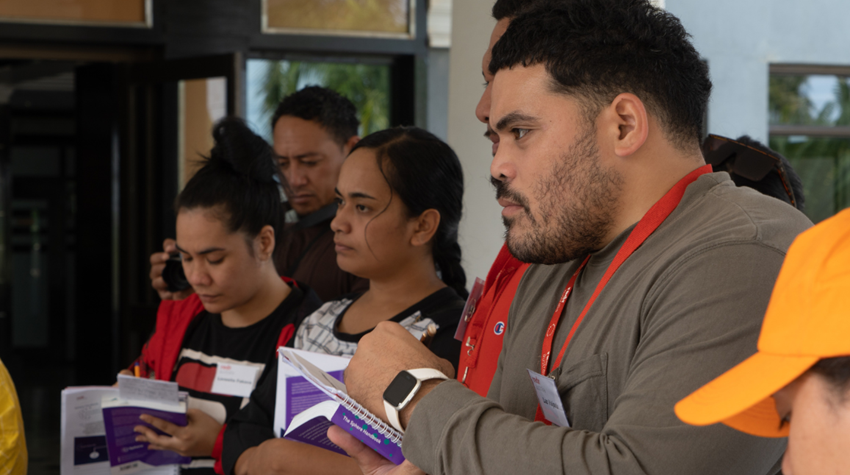Australia Assists, the Australian Government’s humanitarian civilian deployment program implemented by RedR Australia, is committed to working in partnership with our Pacific neighbours to bring specialised humanitarian training to the region, strengthening local humanitarian and disaster management.
The six-day course was led by experienced trainers from Fiji, New Zealand and Australia with attendees taking part in both practical and theory-based learning covering everything from emergency coordination to humanitarian best practices.
The EHP course can also serve as a pathway for Tongans to join the RedR Australia roster of technical specialists who deploy through the Australia Assists Program, giving more Pacific Islanders the opportunity to share their knowledge and skills in the region and beyond.
Strengthening locally led response
Tonga is the third most at-risk country for natural hazards. The threat of volcanic eruptions, tsunamis, storms, and tropical cyclones means the small island nation needs to continually be prepared to respond to a multitude of natural hazards.
Moana Kioa, Deputy Director of National Emergency Management Office (NEMO), knows this better than most being at the forefront of disaster response in Tonga. After completing the EHP in Fiji in 2022, Moana became a strong advocate for the training to be delivered in her home country. She understood how it could assist local disaster professionals to improve their humanitarian knowledge and emergency coordination.
“Disaster risk management and the humanitarian field of work is an area that is still under studied here in Tonga. We normally have to look for short-term technical assistance.” She said. “Through EHP training, we can train people in-country so that we can call on them when there's a need from us.”
Fijian national and RedR Australia Associate Trainer Koila Costello, understands the importance of training local humanitarians in a region that is highly susceptible to sudden onset disaster as well as the impacts of climate change.
“There's a growing threat, and we're experiencing it across the Pacific. We are far more vulnerable to natural hazards and climate change,” she said. “It helps us when we are able to do courses like this, to help our people connect to the climate change phenomena as well as help us prepare and respond better.”
Participant Neomai, a WASH Focal Point with the Ministry of Health Tonga, shared that the lessons she learned on the EHP course will be integral to responding to future disasters.
“If a disaster occurs, we will be able to add the knowledge and the skills that we learned from the course and our experiences, applying it before the international agencies arrive here in Tonga.”
Sesilia Malialosa Tapueluelu, a Project Officer with Caritas Tonga is looking forward to sharing the knowledge and skills she gained with her peers.
“I will share what I have learned in our organisation as we are first responders in an emergency. It will improve the way we do our response.”
 Attendees participated in a full day simulation exercise to consolidate their learning
Attendees participated in a full day simulation exercise to consolidate their learning
Building bridges
It is not only the practical lessons learned from EHP that makes this course impactful. The opportunity for participants to break down barriers and make connections with others working in the sector is invaluable.
“The most important thing is the opportunity to network and share with people you're either facilitated by or working with,” Course Coordinator Leonie Barnes said. “I heard participants talking one day at lunch. They said, “Well, I sort of knew them, but I didn't know them. Now I've worked with them, I can pick up the phone and talk to them.”
Cassie Cohen, First Secretary, Australian High Commission in Tonga completed the course back in Australia and sees the value it can bring to the country.
“I saw how much it brought the participants together in the course and strengthened knowledge of the humanitarian sector for people across a whole range of government and civil society organizations.”
“I'm glad that it's come to Tonga, because I think there'll be a lot of value for the people of Tonga, particularly after the Hunga Tonga-Hunga Ha’apai disaster last year. I think there's a lot of room for drawing on that knowledge for future responses.”

“It’s a must do”
Attendees gave the course an overall satisfaction rating of 98 per cent with participants sharing that they learned the importance of coordination and communication when it comes to a more effective humanitarian response.
“The course has been received with gusto, with enthusiasm, and so well supported by all of the stakeholders around,” said Course Coordinator Leonie. “I really believe that this will have a lasting impact for the future of the people of Tonga.”
 Participants from NGO’s, government ministries and disaster response agencies completed the six-day course
Participants from NGO’s, government ministries and disaster response agencies completed the six-day course
For Ashley Fua, a National Coordinator for Hunga Tonga-Hunga Ha’apai Recovery with NEMO the course was eye opening.
“It will change the way Tonga responds to disasters,” he said.
“It's a must do. If you're looking to working in the humanitarian area, or if you are a person that works in the disaster space, EHP is a must.”
Through the delivery of professional humanitarian training such as the Essentials of Humanitarian Practice, Australia can continue to proudly support our Pacific neighbours to better prepare for and respond to natural hazards and other disasters.
The Essentials of Humanitarian Practice course was delivered with the support of Australia Assists – Department of Foreign Affairs and Trade, Rotary Melbourne, Rotary Balwyn, USAID Climate Ready Project and The Baker Foundation.


